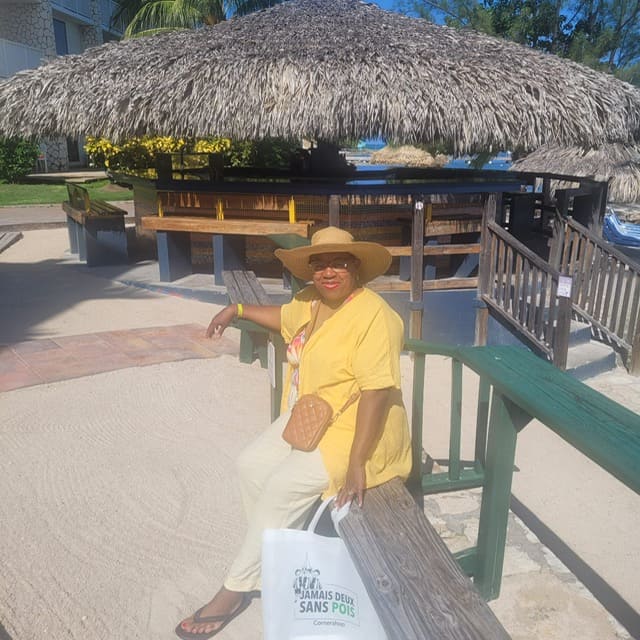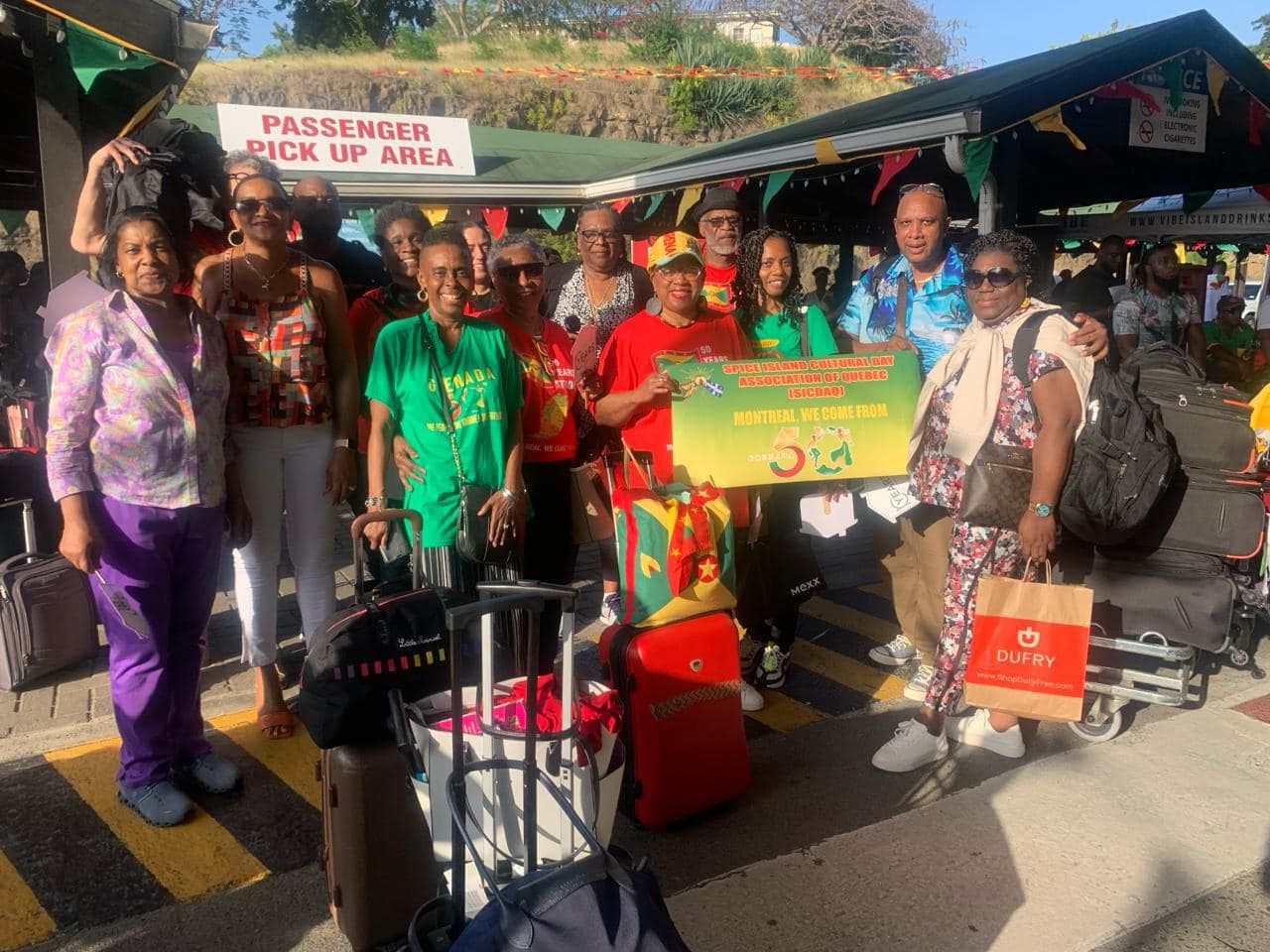
Listen to this Article
Airports used to be Gemma Raeburn-Baynes’ racetrack. She remembers dashing from one gate to the next, suitcase wheels rattling behind her. These days, she plays it smarter. At 75, she orders a wheelchair when she books her ticket, and by the time she lands on the Caribbean island of Grenada or the Dominican Republic, there’s someone ready at the gate to wheel her right through customs and into a taxi.
“I don’t feel bad about it anymore,” she says, laughing. “It makes the trip smoother. And sometimes later, people see me dancing and say, wait a second, didn’t you just arrive by wheelchair?” I just smile and think, well yes, but at my age, that chair saves my energy so now I can enjoy myself.”
That mix of practicality and joy sums up her approach to travel today.
Her most frequented vacation places? The Caribbean!
Planning beats problems
Gemma swears by advance planning, especially when mobility or health issues can throw in a few extra curveballs. She doesn’t leave taxis to chance. Caribbean minibuses may be cheap, but climbing into them can be impossible with sore knees or heart trouble.
“I plan ahead,” she says. “I know taxis are my only option, so I set aside at least $500 just for transport. That way I don’t have to stay stuck at the hotel.”
Gemma’s tip: Block off a dedicated “ride fund” before you pack. That way you can say yes to exploring instead of calculating whether you can afford it when you’re there.
Seniors are welcome here
Accessibility isn’t the same everywhere, and Gemma has discovered the difference a thoughtful hotel makes. In Grenada, the Kalinago Beach Resort built a ramp for a guest who couldn’t manage stairs. Staff even filled his bathtub with seawater so he could enjoy a “sea bath” when the beach was too tough to reach.
“It blew me away how much effort they made,” she says.
She’s also a fan of the Radisson in Grenada, where staff put guests with mobility issues on ground floors to avoid stairs. “They don’t make you feel like an inconvenience. They make sure you can enjoy your stay like everyone else.”
Gemma’s tip: Ask hotels directly what they can do to help with mobility or health needs. The answer may surprise you. Some go out of their way to make your stay easier.
Handling surprises
Delays, cancellations, and unexpected overnight stays? Gemma doesn’t let them ruin her trips. Once in Barbados, her flight was cancelled and she had to spend the night at a hotel. “It was a little worrying,” she admits. “You don’t want to stay somewhere unexpected with no clothes and whatnot.” The airline arranged transport, gave her a breakfast voucher and picked her up the next morning for the rescheduled flight. The trick, she says, is patience.
“Don’t get upset. They usually give you a voucher for meals, and eventually you’ll be on your way. I just remind myself I’m on vacation.”
She also knows medical surprises can happen. In the Dominican Republic, she once ended up in hospital with pneumonia and congestive heart failure. Scary, yes, but she remembers the kindness of the staff who treated her. “They had me in an ambulance right away. I couldn’t believe how well they cared for me.”
Gemma’s tip: Keep meds and a one-night kit in your carry-on. Add a paper list of prescriptions, conditions and your doctor’s phone number. Keep calm when flights or plans shift. Airlines usually help, and flexibility makes the experience less stressful.
Packing smart
When asked what three items she won’t leave behind, Gemma doesn’t hesitate: swimsuit, casual shorts set, and evening wear.
“On a cruise, you need something dressy. But I’ll never skip my bathing suit. Every island I visit, I want to test the beach. But nothing compares to Grand Anse beach in Grenada.”
She swears by four-wheel suitcases too. No more dragging a heavy bag or suitcase, just glide your spinner luggage beside you. It’s one of those small conveniences that makes travel friendlier on aching joints.
Gemma’s tip: Choose clothes that match the trip you’re on and luggage that works with you, not against you. Small upgrades like a rolling bag can make travel much easier.
Making memories
Gemma still takes hundreds of photos but admits these days, most stay on her computer instead of in printed albums. What she treasures most are keychains. She’s collected them from every country she’s visited, starting with trips during her working days. Her grandson now loves looking at them, asking, “Where did this one come from, Grandma?”
“That collection carries so many stories,” she says.
Gemma’s tip: Don’t leave your photos hidden on your computer forever. Print a few favourites now and then and keep albums handy. If you collect something like keychains, display them so your travel stories can be shared with family and friends. Souvenirs are story-tellers so whether that’s photos, keychains or something else you love, the value is in the memories they evoke.
Lessons for fellow seniors
If you’re considering travel in your 60s, 70s or beyond, Gemma’s advice is clear: don’t overthink it.
“When you’re young, see as much as you can. You might do four countries in a week, like I did in Europe. Later on, you’ll want to go back and spend a week in one spot, really soaking it in. That’s the beauty of senior travel, you know what you enjoy, and you take your time with it.”
She also stresses staying active. “Don’t let illness pin you to the couch. Plan trips, keep busy, move around. If I want to go on a cruise, I go on a cruise. Sitting at home thinking about what hurts won’t help.”
Gemma’s tip: Build rest into your itinerary. Schedule activity days and chair days. On chair days, book a spa hour, read by the pool, enjoy a slow lunch. Don’t hold back. Travel while you can and adapt as you need. Energy and health may change, but the joy of travel doesn’t have to.
Dream destinations ahead
If you’re considering travel in your 60s, 70s or beyond, Gemma’s advice is clear: don’t overthink it.
“When you’re young, see as much as you can. You might do four countries in a week, like I did in Europe. Later on, you’ll want to go back and spend a week in one spot, really soaking it in. That’s the beauty of senior travel, you know what you enjoy, and you take your time with it.”
She also stresses staying active. “Don’t let illness pin you to the couch. Plan trips, keep busy, move around. If I want to go on a cruise, I go on a cruise. Sitting at home thinking about what hurts won’t help.”
Gemma’s tip: Build rest into your itinerary. Schedule activity days and chair days. On chair days, book a spa hour, read by the pool, enjoy a slow lunch. Don’t hold back. Travel while you can and adapt as you need. Energy and health may change, but the joy of travel doesn’t have to.
Final word
Travel, at any age, takes a mix of courage, planning and play. Gemma Raeburn-Baynes reminds seniors they don’t need to give up adventure. They just have to adjust the playbook.
Wheelchair at the airport? Order it.
Taxis instead of buses? Budget for it.
Medical hiccups? Don’t let them stop you, prepare, then keep moving.
Most of all, she says, don’t wait. “When you’re young, go. When you’re older, keep going. Because no matter how old you are, there’s always another keychain waiting to be added to your collection.”

